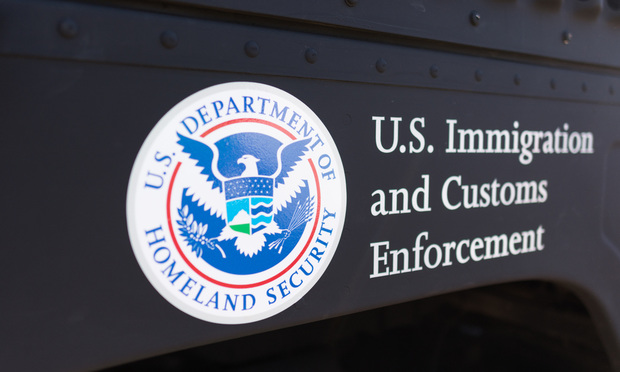Rush To Rule: More Trump-Era Agency Actions Destined for a Loss in Court
As of Oct. 7, 2020, the Trump administration has lost a staggering 119 times in federal court over its use of agency action. It has been successful 22 times. With that in mind, this article summarizes some of the most impactful changes.
October 30, 2020 at 10:15 AM
13 minute read
 On Oct. 8, 2020, the U.S. Citizenship and Immigration Services (USCIS) published an interim final rule (IFR) that revised the definition of the term "specialty occupation" and placed additional restrictions on third-party placement of H-1B workers. The U.S. Department of Labor (DOL) contemporaneously published an IFR amending the regulations governing permanent labor certifications (PERM applications) and labor condition applications (LCAs) in order to substantially increase prevailing wage levels.
On Oct. 8, 2020, the U.S. Citizenship and Immigration Services (USCIS) published an interim final rule (IFR) that revised the definition of the term "specialty occupation" and placed additional restrictions on third-party placement of H-1B workers. The U.S. Department of Labor (DOL) contemporaneously published an IFR amending the regulations governing permanent labor certifications (PERM applications) and labor condition applications (LCAs) in order to substantially increase prevailing wage levels.
By issuing these IFRs, both agencies appear to have bypassed the administrative law requirements regarding public review and comment. This alone makes an immediate legal challenge a certainty. Aside from sidestepping the rulemaking process, these IFRs were put forth by Chad Wolf, whose lawful appointment as acting secretary of the Department of Homeland Security (DHS) was called invalid by the Government Accountability Office two months ago and by a federal judge last month. Just last week, in Immigrant Legal Resource Center, et al., v. Chad F. Wolf, et al. (N.D. Cal., 3:20-cv-05883), a federal district court enjoined DHS from moving forward with a filing fee hike.
A few days later, the same federal judge issued an order preventing the State Department and DHS from "engaging in any action that results in the non-processing or non-issuance of applications or petitions for visas in the H, J, and L categories," which the Trump administration sought to ban in Proclamation 10052.
This content has been archived. It is available through our partners, LexisNexis® and Bloomberg Law.
To view this content, please continue to their sites.
Not a Lexis Subscriber?
Subscribe Now
Not a Bloomberg Law Subscriber?
Subscribe Now
NOT FOR REPRINT
© 2025 ALM Global, LLC, All Rights Reserved. Request academic re-use from www.copyright.com. All other uses, submit a request to [email protected]. For more information visit Asset & Logo Licensing.
You Might Like
View All
NYAG’s Enforcement of Mandated Cybersecurity Safeguards Sends Expensive Shock Waves through Varying Industries
9 minute read
Absent Explicit Agreement, Court Rejects Unilateral Responsiveness Redaction of Text Messages
10 minute read
Don’t Blow It: 10 Lessons From 10 Years of Nonprofit Whistleblower Policies
9 minute readLaw Firms Mentioned
Trending Stories
- 1Troutman Pepper, Claiming Ex-Associate's Firing Was Performance Related, Seeks Summary Judgment in Discrimination Suit
- 2Law Firm Fails to Get Punitive Damages From Ex-Client
- 3Over 700 Residents Near 2023 Derailment Sue Norfolk for More Damages
- 4Decision of the Day: Judge Sanctions Attorney for 'Frivolously' Claiming All Nine Personal Injury Categories in Motor Vehicle Case
- 5Second Judge Blocks Trump Federal Funding Freeze
Who Got The Work
J. Brugh Lower of Gibbons has entered an appearance for industrial equipment supplier Devco Corporation in a pending trademark infringement lawsuit. The suit, accusing the defendant of selling knock-off Graco products, was filed Dec. 18 in New Jersey District Court by Rivkin Radler on behalf of Graco Inc. and Graco Minnesota. The case, assigned to U.S. District Judge Zahid N. Quraishi, is 3:24-cv-11294, Graco Inc. et al v. Devco Corporation.
Who Got The Work
Rebecca Maller-Stein and Kent A. Yalowitz of Arnold & Porter Kaye Scholer have entered their appearances for Hanaco Venture Capital and its executives, Lior Prosor and David Frankel, in a pending securities lawsuit. The action, filed on Dec. 24 in New York Southern District Court by Zell, Aron & Co. on behalf of Goldeneye Advisors, accuses the defendants of negligently and fraudulently managing the plaintiff's $1 million investment. The case, assigned to U.S. District Judge Vernon S. Broderick, is 1:24-cv-09918, Goldeneye Advisors, LLC v. Hanaco Venture Capital, Ltd. et al.
Who Got The Work
Attorneys from A&O Shearman has stepped in as defense counsel for Toronto-Dominion Bank and other defendants in a pending securities class action. The suit, filed Dec. 11 in New York Southern District Court by Bleichmar Fonti & Auld, accuses the defendants of concealing the bank's 'pervasive' deficiencies in regards to its compliance with the Bank Secrecy Act and the quality of its anti-money laundering controls. The case, assigned to U.S. District Judge Arun Subramanian, is 1:24-cv-09445, Gonzalez v. The Toronto-Dominion Bank et al.
Who Got The Work
Crown Castle International, a Pennsylvania company providing shared communications infrastructure, has turned to Luke D. Wolf of Gordon Rees Scully Mansukhani to fend off a pending breach-of-contract lawsuit. The court action, filed Nov. 25 in Michigan Eastern District Court by Hooper Hathaway PC on behalf of The Town Residences LLC, accuses Crown Castle of failing to transfer approximately $30,000 in utility payments from T-Mobile in breach of a roof-top lease and assignment agreement. The case, assigned to U.S. District Judge Susan K. Declercq, is 2:24-cv-13131, The Town Residences LLC v. T-Mobile US, Inc. et al.
Who Got The Work
Wilfred P. Coronato and Daniel M. Schwartz of McCarter & English have stepped in as defense counsel to Electrolux Home Products Inc. in a pending product liability lawsuit. The court action, filed Nov. 26 in New York Eastern District Court by Poulos Lopiccolo PC and Nagel Rice LLP on behalf of David Stern, alleges that the defendant's refrigerators’ drawers and shelving repeatedly break and fall apart within months after purchase. The case, assigned to U.S. District Judge Joan M. Azrack, is 2:24-cv-08204, Stern v. Electrolux Home Products, Inc.
Featured Firms
Law Offices of Gary Martin Hays & Associates, P.C.
(470) 294-1674
Law Offices of Mark E. Salomone
(857) 444-6468
Smith & Hassler
(713) 739-1250







